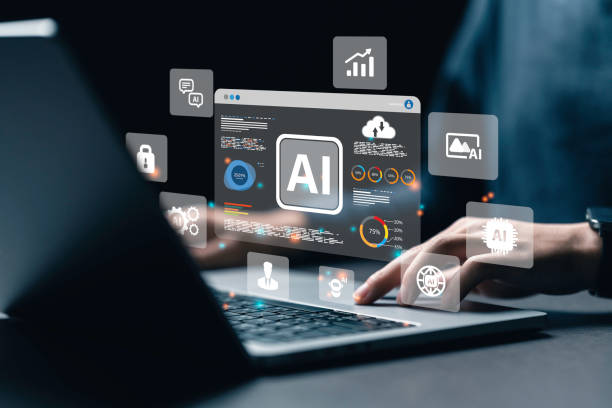Artificial Intelligence, in the last couple of years, has evolved from an esoteric technology into a mainstream phenomenon that is touching almost every part of human life-from personal assistants like Siri and Alexa to complex algorithms influencing the feeds of social media.
AI is rewriting the way humans will interact with technology and with each other. For beginners, this can be a world that is as fascinating as it might be overwhelming. This guide aims to demystify artificial intelligence by explaining the important concepts, applications, and implications of the field in a non-technical way.
AI is rewriting the way humans will interact with technology and with each other. For beginners, this can be a world that is as fascinating as it might be overwhelming. This guide aims to demystify artificial intelligence by explaining the important concepts, applications, and implications of the field in a non-technical way.
What is Artificial Intelligence?

Artificial Intelligence basically refers to the processes of imitation by machines, especially computer systems, of processes that can be referred to as characteristics of human intelligence.
The processes involved include learning, which includes the acquisition of information and rules for using the information, reasoning, which involves arriving at an approximate or definite conclusion using the rules, and self-correction.
In simple words, AI can be described as a system designed to perform tasks which, if done by a human, would be said to require intelligence.
The processes involved include learning, which includes the acquisition of information and rules for using the information, reasoning, which involves arriving at an approximate or definite conclusion using the rules, and self-correction.
In simple words, AI can be described as a system designed to perform tasks which, if done by a human, would be said to require intelligence.
Types of Artificial Intelligence
There are mainly two types of Artificial Intelligence:
- Narrow AI (Weak AI): It is designed and trained for specific tasks. Facial recognition software, language translation applications, and recommendation systems used by Netflix and Amazon are examples. Currently, narrow AI is the most common form of AI. It does very well in specific tasks it was programmed for.
- General AI: Sometimes referred to as Strong AI, it is a type of AI that would have the ability to learn, understand, and apply intelligence on any type of task that a human could. General AI remains highly theoretical and does not yet exist in realistic applications.
Key Concepts in Artificial Intelligence
Understanding a few of the basic concepts helps to frame the overall landscape. Here are a few key terms:
- Machine Learning: A subcategory of AI that consists of teaching a system to develop the ability to learn from available data to enhance its output over time without explicit programming. For instance, an ML model can analyze sales data for a given period and predict sales in subsequent times.

- Deep Learning: A subcategory of ML, but new and advanced, which utilizes neural networks with many layers (hence "deep") to analyze several factors and patterns. Deep learning underpins many of the recent breakthroughs in image and speech recognition.
- NLP: This aspect of AI deals with computers and human interaction using natural language. By the application of NLP, machines are allowed to comprehend, interpret, and act accordingly in a human language meaningful manner, thus powering a variety of things like chatbots and virtual assistants.
Applications of Artificial Intelligence
It is important to recognize that AI has already been integrated into various industries, each aimed at facilitating efficiency and innovation. Here are a few key applications:
- Health Care: AI is transforming diagnostics and patient care. For instance, AI algorithms can analyze medical images for the discovery of conditions like cancer at an earlier stage than traditional methods allow.

- Finance: AI assists financial institutions in fraud detection, risk estimation, and automation of trades. Machine learning models can investigate patterns in transactions for suspicious activities.

- Transportation: Traffic management systems and self-driving cars use AI so that they can be safer and less congested. AI technologies enable these vehicles to perceive their environment and make decisions in real time.

- Entertainment: In this field, AI algorithms are being used by streaming services to analyze user preferences and make personalized content recommendations to enhance viewer experience.

Ethical Considerations and Challenges
While the potential for AI is huge, it also raises several ethical concerns and challenges:
Job Displacement-A number of people are afraid that their jobs will become redundant with the advent of AI. Many believe AI can replace human labor in various professions, which would bring about immense changes in the economic order of things.
- Bias in AI: It is easy for AI systems to hold biases unconsciously with the biases in their training datasets and will lead to the generation of prejudiced outcomes. Suppose a face recognition system becomes biased towards one type of dataset; it will fail then to recognize people from other different backgrounds.
- Privacy Issues: A huge amount of data is required to train AI systems, which inadvertently creates privacy issues. Many times, users share personal data without realizing its usage.
The Future of Artificial Intelligence
The future of AI is bright, with both promise and challenge. As technology continues to evolve, AI might bring eventual breakthroughs in topics ranging from climate change to personalized medicine to space exploration.
But stringent ethical considerations and formal mechanisms for responsible development of AI are required to ensure that the benefits from this promise of AI come with minimum risks.
But stringent ethical considerations and formal mechanisms for responsible development of AI are required to ensure that the benefits from this promise of AI come with minimum risks.
AI, Some of us use ChatGPT and InvideoAI(Used to create a specific video depends on what u wish), Most often,
Artificial intelligence is completely changing our world in ways only now being understood. The ability to understand the basics and composition of the entity allows one to knowledgeably take part in conversations about potentials and challenges.
And as AI continues to evolve, staying informed and curious equips us to navigate this complex landscape responsibly. Whether one is a student, professional, or simply a technophile, one needs to understand AI to be better prepared for the future.
And as AI continues to evolve, staying informed and curious equips us to navigate this complex landscape responsibly. Whether one is a student, professional, or simply a technophile, one needs to understand AI to be better prepared for the future.







Comments(0)